A computer doesn’t forget, it deletes. Its memories do not drop off the candle’s wick. Everything discarded is done so by some purpose, the will of the user or an overloaded failure of the hardware. People’s sense of memory can be more convenient; we can amplify the emotions of one moment to captivate the entire chapter. For many, the past becomes nostalgic: it’s easier to snip out the details we’re more often consumed by in the present. Even our feelings about computers gets nostalgic. Garden of Delete, the new album from Daniel Lopatin, aka Oneohtrix Point Never, doesn’t forget.
It is highs and lows simultaneously, a hazy spell cast over old familiars and comforting sounds, the popcorn akin to those old Mind’s Eye shorts, pierced by embarrassments, cornball guitar riffs and mushy oversentiments. Its lead player, a teenaged alien named Ezra, is plagued by acne and anxiety. OPN’s compositions have generally sounded like choirs of the computers, dabs of user interface sounds designed as tools, drawing their listenable properties out like a singing coach. Garden of Delete is more intimidating, though. During the first leg, the music cuts out into dead silence like something’s wrong. One track, “Animals,” feels profoundly sadder than what we’ve usually encountered. There are lyrics, apparently, too distorted and inhuman to naturally pluck out.
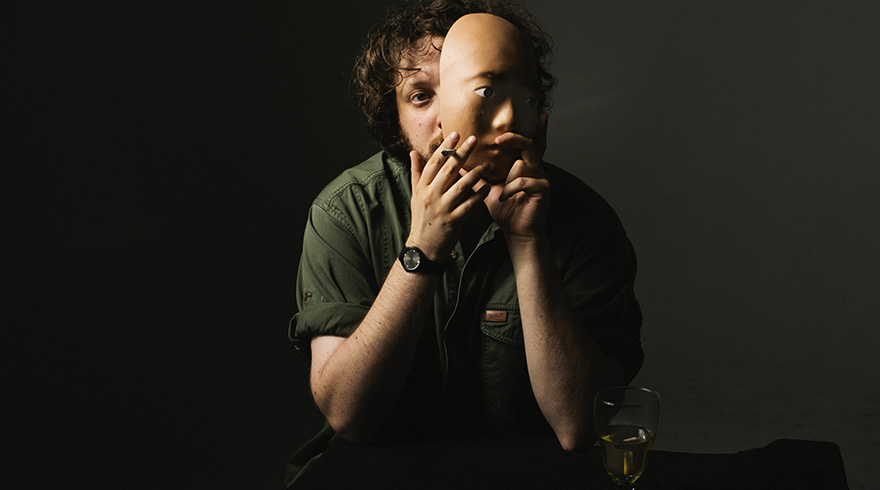
I spoke to Lopatin over the phone about arriving to this mood, the realities of touring with your childhood heroes and how we talk about technology. And videogames. Don’t worry. We talk plenty about videogames too.
Zack Kotzer (ZK): So, being frank, I’m representing a videogame magazine. I know it comes up a lot in conversations with you and I’m almost wondering if it’s a good starting point or just patronizing by now, but how have games influenced you?
Daniel Lopatin (DL): Yeah, they’re hard to avoid. I wouldn’t call myself a gamer because I’m just not that good at games at the end of the day. But my friends are. I grew up with videogames, you know. I was born in ’82, I got the NES for my… I don’t know, seventh or eighth birthday or something like that. I loved it, got into it. Went over to SEGA after that, PS1, PS2, PS3, PS4.
ZK: Just straight down the line.
DL: Straight down the line with PlayStation, and I started playing The Witcher ’cause I’d had it for awhile, but I didn’t know what else to do last night, so I just started playing The Witcher. I love videogames on a level that, I think when I was a kid, the fact that they were more fantastical and ridiculous within a closed system of programming… music almost came from the same code as the game did… I think that in a way was interesting for me ’cause you know, it sounds like nothing else. The rest of the time you turn on a TV or something and you hear music. So it wasn’t really until TV where you could just preload audio files into a game, and that was part of the latticework of the game, was just recorded music. That’s when games started blending more with pop culture… to me that wasn’t psychedelic or hallucinatory, looking back I think the music from Metroid stuck with me forever but I couldn’t tell you what the loading screen music from X or whatever.
ZK: It doesn’t have to be so specific or citational.
DL: I’m just thinking about it. I think in general the idea that videogame music was really composed and melodic in a way that didn’t really connect to any kind of thought form, it was like this strange kind of reality that was somewhere between a score and a little song. That’s what I kind of loved.
ZK: There’s a lot going on with the people that composed that music, because one, there’s the technical limitations, but two, a lot of the sound you’re sort of designing is in a way a tool for the people interacting with this world to be able to interpret different actions or different settings
DL: Yeah, there’s a pragmatic aspect to it as well. I think now, in terms of what excites me about videogame music, is more to do with how music and sound designers are non-discrete. They kind of blend. So, you have this interesting interplay of sound design and music. Sound design’s actually harmonically in the same family as the music and interesting sound relationships emerge from getting through some kind of conflict. That, to me, is much more futuristic sounding. Music, if you just take that whole experience verbatim and say, “Okay, I’m not separating any of these sounds or any of these features, I’m just going to listen to this whole thing,” to me that sounds like future music, that’s how I want music to sound, music that would be on the radio. The new Killer Instinct is totally like that. I’m just so bewildered by all the layers of sound and music that to me it just sounds like truly radical music. And I think some of that came into the new album.

ZK: You’ve talked a bit in other interviews about characters you created for Garden of Delete to be a sort of score to, like Ezra. Did you come up with the characters in this world before you started composing this music?
DL: Completely afterwards. I made the record and then I saw that ahead of me was five months of waiting for the records to come out and I just wanted to do something meaningful. A lot of the press stuff that you have to do, not stuff that you want to do, can feel pretty tedious, so I was like, “I’m gonna have to do that, yes, but I’m also gonna have conversations with myself and thus, a public conversation with myself is also a conversation with my audience.” Really it turns into making all of these weird peripheral ideas and characters and ultimately this fractured universe around the record that I could use to explain the thing I just made to myself or kind of explore ideas around it without being real specific or without getting on a soapbox to say: “This is what my music is about.” It wasn’t at all as conceptual as it might occur at first glance; it was really just vague thought and universe building.
ZK: Did you start to view the music differently after you created these people to inhabit it?
DL: Maybe a little bit. You just notice certain anomalies or certain parallels or certain strange little morsels of information that kind of tie things to each other, but again, it’s just like throwing a bunch of stuff in a tumbler, seeing what emerges and ultimately just enjoying all these relationships and ideas, just seeing what’s humorous or seem like they could maybe branch out and be something else. Or use it as an exercise to develop ideas for the music video. For me, under the perfect circumstances, this whole universe can be a graphic novel, or an absolutely insane film, or a game. I don’t think that I endeavor to do all those things or claim that they’re doable, but I love those kind of strong ideas out there and just seeing their results. New ideas that come from them.
ZK: You seem to leave the window open a little bit with the video for “Sticky Drama,” which is a pretty literal live-action role-playing game.
DL: Yeah, completely, because me and Jon (Rafman), once we got the ball rolling, I had this universe and these characters, and I brought them to Jon. So we started working with the more plausible things, and he has a way of twisting, fragmenting things into his own world view, so naturally it became much more collaborative and much more interesting than anything I could have possibly come up with on my own. But you know, we were laughing that this could be, we can do a whole Troma thing off just this one idea. It could be completely a radicalized, sub-basement version of Disney.
ZK: Who’s in your big tentpole franchise? Who’s your Avengers roster?
DL: Growing up in Massachusetts and going to school at Hampshire College, Teenage Mutant Ninja Turtles was always the thing. I would hope that from the video it seems the villain, who’s collecting the Tamagotchis selfishly, kind of in an Icarus-like manner, trying to instrumentalize all his army and imperialize on everybody’s fun, and ultimately he’s killed because of his desire to have every single Tamagotchi. I think he would be a star at the end, he’s kind of Shredder-ed out. But, as I clearly would have to mark this as a major player. I think a movie would be sweet.
ZK: How would you describe your relationship to sort of the technologies we see come and go, as we grow up?
DL: I remember sitting at a bus stop with my grandpa, I was pretty young, maybe I was 17 or 18. I really see my grandpa as getting up there in his years, you know we used to hang out all the time, and I was pretty sad because I felt like maybe he was slowing down. I remember sitting at this bus stop with him and the cars going by and I was like, “Grandpa, what do you feel when you see all these cars? You’ve seen cars change so much for so many years. Do they look strange to you?” And he said, “I don’t know, they’re cars.” So, as I get older I feel like maybe he’s right, even though I feel like I’m sensitive to these things more than a guy like him. I wish I could say that I felt that the world was like changing as quickly as (futurist Ray) Kurzweil wants it to. To me there’s so many fundamental issues that I have to on a daily basis with the way people communicate, with the way people treat each other, with any number of unfortunate kind of realities seem to emerge.
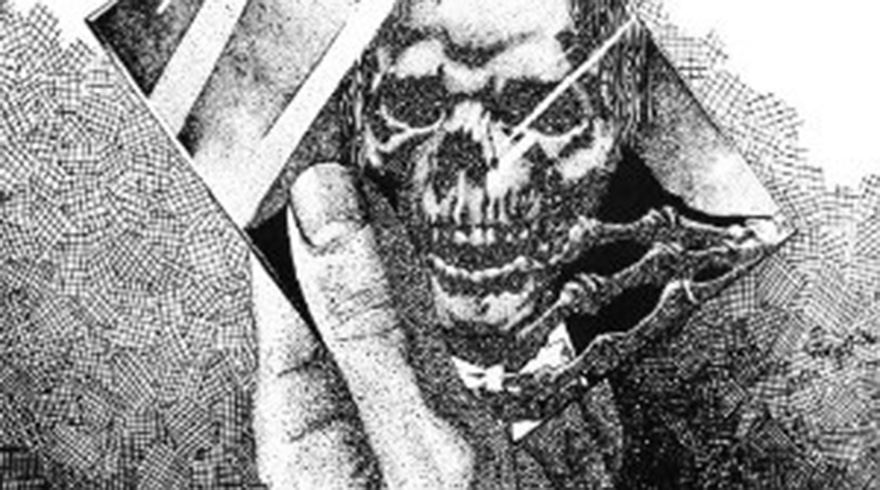
Any time I’m doing something or just going through an airport I just feel like, “Why am I being pasteurized?” Why am I being put through this? If there is a future and there are airports, 50-100 years from now, they might laugh at the sort of draconian way we dealt with security. I think there’s probably much more effective ways to recognize who people are and get them through places on this earth in a more civilized way. There’s other things that amaze me, like I remember clearly a time when it wasn’t so easy and so obvious to get a car and just go from one place to the next. I feel like in some ways do people really understand what a luxury it is to be able to get money out of a machine? Or jump into an Uber? But we adapt to these things so quickly, and we just accept them.
ZK: I often wonder with the generations below us, what their perception of computers and the Internet and technology are going to be, since it’s so much more encompassing and resourceful for them. Like, full-time access to all these things, but when I was young I remember dial-up and I remember it just being this frustrating tool, that had its hiccups and took its time to process.
DL: Exactly, that weird dial tone sound and you had to wait, had to connect, then you’re loading slowly. It’s not that far away. I definitely remember that as well. I wonder if it’s because we so quickly adapt, and become in a technocratic society, even biologically we’re learning to forget the difficulties of technology very quickly. It’s funny because someone was recently talking to me about the phenomenon in which essentially memories are stored in our DNA, which makes perfect sense if you think about it.
ZK: Someone brought that up to me to, the concept that certain traumas can affect the body on a strictly genetic basis to even pass on from one person to the next like a small dab of evolution.
DL: It was even in the news recently, maybe a couple days ago. It makes perfect sense—that would explain instincts so well, because if you have these traumas, these understandings of these fear-based, implicit reactions coated into your DNA, or thousands of years of being traumatized by being attacked, I’d understand why we need to react to those things. I would imagine at some point we are going to have all these computer memories as well, or teach us how to deal with emerging technologies. We adapt really quickly, on some levels, so that’s a positive.
ZK: I don’t want to do a misreading, but I feel like there’s a bit of this even in your own music, because so often you’ll take familiar digital sounds or items and recontextualize them in sort of the mood or the setting. Like going all the way back to “Child Soldier,” it sounds like you’re having a bad trip in an arcade. Street Fighter, Space Invaders are just sort of jumbled together to form sort of a chorus. Even in your new song, “Ezra” there’s wails of guitar that don’t really feel like the kind of setting that the usual shriek of a guitar would accompany.
DL: I tend to think about it in terms of honesty. Honesty is part of being an artist. But to me I have this thing where I feel that music needs to encompass the entire situation that is listening. Listening is, to me, part of music-ing. When I try to write a piece of music, it has functionality. It’s a song, but beyond that the way that it’s arranged, the way that things are kinda smashed together, glued together, or taken apart. Whatever kind of arrangement, they need to absorb the whole of what I feel, when I’m perceiving sound. The easiest way for me to explain that is that you have a CD, and the CD’s got music on it. But before you listen to that piece of music, and absorb it as a song, you have to hit open on the CD tray, there’s mechanical sounds that happily do that, you feel the disc, you might see a reflection of life from the disc from the sun coming through the window, you have to put it on the tray, you have to close the tray, you have to get the laser working, the motors spinning. You have to listen to that piece of music, and also depend with all the things that are on your mind that may or may not permeate to that piece of music. When I became cognizant to this, I can characterize it as some sort of allegory. Using music, using sound, using texture, I can characterize the whole situation that is listening—and still write music. I became really obsessed with that, obsessed with that idea that to me was a way to be really honest with myself about the way I perceive reality. Not just as a person, a person that kinda shares something idiosyncratic about my music. So when I do these things, it’s to really be like, “Hey, this is the way I see this.”
ZK: Is there a sort of sense of rediscovery with that?
DL: Yeah, every time it’s an interesting challenge to see what material here emerges as the main one. Like it seems like this one is encoded with history, with these ideas. This one’s really kind of a formalized historical idea, formalized through a touch of historical ideas, this song, this progression that I’m obsessed with is that, armature of the piece. This one’s really personal, this song’s about this lyrical thing, that I can decorate those lyrics and stack all them and texture them along the edges with this idea about sound. It’s endless for me. My favorite synthesizer is me. Once I flatten all these ideas and make them even, make them equitable to each other, whether an idea, or a sound, or a piece of music, or a progression, or a feeling, when all these things are equal, and given credence to be musical weapons, then I can make cool stuff endlessly.
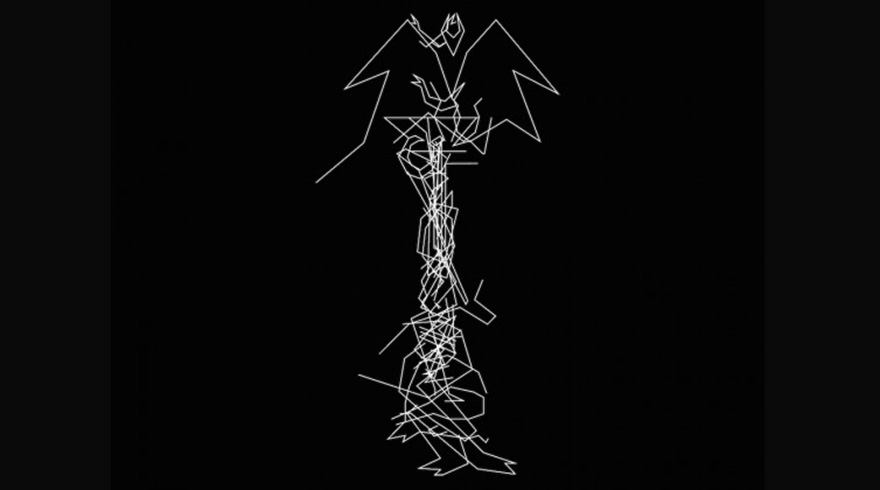
ZK: With Garden of Delete there seems to be a lot of themes of one’s adolescence but without that general nostalgia that people feel when talking about growing up. Do you think nostalgia is productive?
DL: I think it depends on the context, but generally I don’t, I kind of shy away from it, shy away from that word. Because to me nostalgia is a feeling that the past is somehow intrinsically better than the present. And to me that’s unfair. It seems to me as escapist as being really into the future, there’s really no difference, but these rounds of desire for something other than what you are, what you have. That bums me out. The part that I like about it is that those can be the future and the past, being equal; they’re both staging areas for all this speculation. And that’s not so far away from what I love about science fiction, or fantasy, or any of these things that are speculative arts. These are staging areas for your imagination to really reconfigure history and reconfigure philosophy, or reconfigure anything, really.
ZK: There’s definitely a sort of tonal shift lately between Interstellar or Destiny or The Martian, where aspects of science fiction are sort of renewing their optimism, that there are mounting problems but there are people that can still beat them.
DL: Maybe that’s just because we got so burnt out on cyberpunk or something. Which was already kinda ripe with issues. But yeah, optimism needs to be there, you have to be optimistic about yourself, you have to be optimistic about the idiosyncratic potential of whatever it is you’re doing, to share yourself and be as earnest about it as possible, is what I always what I enjoy in entertainment. When I’m just getting something that is custom-tailored from a person who decided to really listen to themselves and to share, I find that I’m mostly drawn to that. These macro-level ideas about things like: Is the future doomed? Is the future great? I don’t care. I’m more interested in what any individual person can tell me through those ideas about themselves as a human being, today.
ZK: It’s very easy to romanticize your own past because you had a different sense of scale of the universe back then.
DL: At least on this record what it was to kind of go back and exhume the crypt of my adolescence, the stuff that stuck with me, speaking with memories and gender and DNA. The traumatic stuff emerged right away, the rest of it … didn’t. So things that I pushed away or didn’t mean to think about for awhile, were like looking at pictures of myself, or even reading my notes, my journal. These weren’t very unique things; in fact I noticed how generic I was. My concerns were generic, my overwhelming obsession with being liked or wanted, or specifically liked a girl that I’d get obsessed with, or my unrelenting naivete, this eagerness I had to be in the world, and that I wasn’t in the world. The world would kinda be around the bend once I was free, and all these very loaded cliches.
ZK: Do you find it a frustrating notion that one’s past is at direct odds with one’s future?
DL: Of course. I think so. It’s tricky. I would imagine that if I didn’t have a project that’s around those ideas, if I was just casually obsessing over it, it would be mega-maniacal and negative. It would be like, “Get a grip dude.” Now you’re this person, you’re this more visible, older version of this other thing, and that’s what you are. You’ve aged, you have things you need to do and accomplish on a daily basis to do them. The only reason it was even interesting to me is that I found myself on this tour with these bands that I had idolized when I was a kid. In a position where I was going to be on this amphitheater tour with Nine Inch Nails and Soundgarden. And by the way, I’m driving to make every sound check every day at 5:30, through the American midwest. You just have a lot of time to think of how you got to that point. You can make the point in the present and the point in the past, with that, and you start filling in the rest with your imagination every day, driving for hours and hours. By the time I got off the tour, I had created this very vague map of terrifying memories. We were listening to (XM hard-rock stations) Ozzy’s Boneyard and Lithium on the rides, we were almost giving ourselves a soundtrack to the whole thing. We were immersing ourselves in the feeling to get ourselves jacked up.
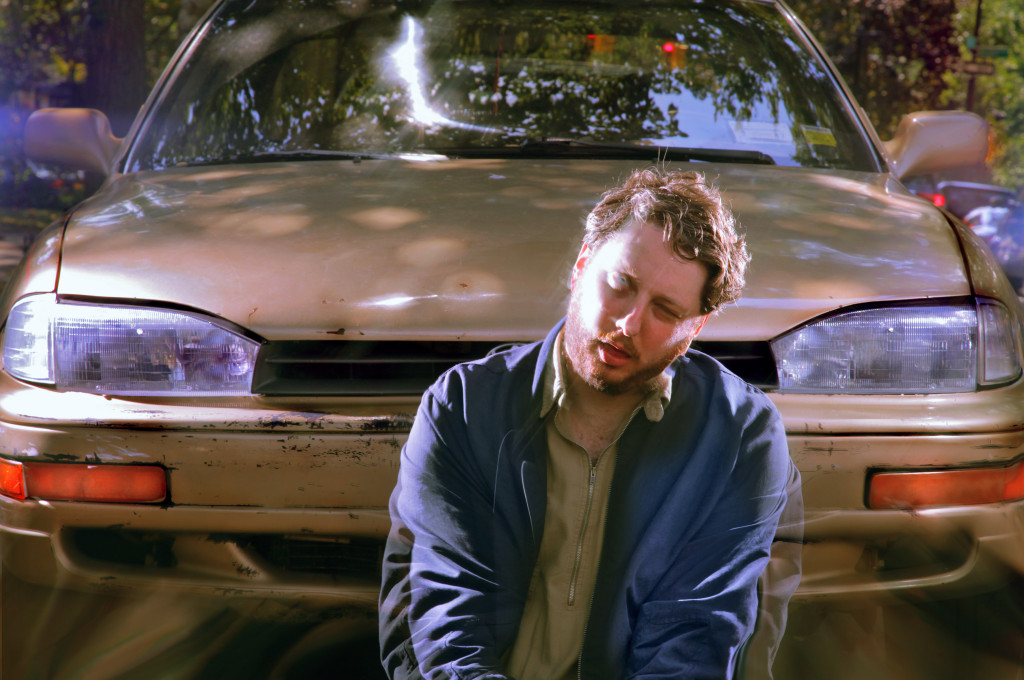
ZK: That must be quite surreal. Touring around with people who were your heroes. That’s a bit of the dream, isn’t it?
DL: Yeah, you can’t fathom it. And after awhile too, you adapt. You adapt to the initial shock. This amphitheater looks exactly like the last one except stage right and stage left is way more narrow. And here’s another day where I go out and play my inane fucking noise to an audience of Soundgarden fans. That’s a very specific scenario that quickly sobers you. This has a certain continuity that starts to emerge. More awkward than awesome. But you know, it was incredible, one of those highlights of my life.
ZK: Hey, if you achieve that sort of thing, achieve those moments, you can be proud of them.
DL: It’s the sort of thing of like everyone thinks that modesty and humility are always the way to go. And it’s so funny, because it’s almost like you didactically decided to take away all of the pleasure of these things that happen in your life, just because you think that it’s a nicer way to be, or something. Just be real with it. You have to recognize the awesome that has been served to you, and it has fucking seasons. There’s gonna be a lot of lows too, you gotta enjoy those highs.
ZK: If you can’t really appreciate the moments you’ve worked for, the moment you deserve, then why drag yourself through everything else.
DL: Yeah, you’re kind of doomed.
ZK: If only you could live like videogames. Videogames rarely have any humility whatsoever. It’s all just action and agency.
DL: It’s funny with videogames, I never feel good when I beat them. I just feel relief. Sometimes I think about videogames and I get extremely bummed out, I get really obsessed with sports games. I’ll get into like the typical binge scenario with like Madden or NBA where it’s just like hours and hours of building up this thing, and I’ve won championships, lost them, done all of these things, it’s the year 2025, or later. I just kind of wake up and this is the most unsatisfying game in the world. I’m doing all this shit and there’s nothing at the end of the rainbow but another year of simulation.
ZK: With the popularity of all these livestreaming game services, on one hand it’s easy to scoff at them, on the other, it’s like, dude, you used to fantasize about people watching play Mario Kart.
DL: I know, like you wanted so badly to show your friends. I dunno, I think I’m playing games the wrong way. I’ll listen to podcasts about games, I hear a lot of people say their major grievances are really long games, these huge campaigns. People are just so burnt out, they just wanna play a short game. Even if it’s kinda on rails, they just want the experience. And the only satisfying gaming start to finish recently was Call of Duty, which I didn’t even like. I thought it was so corny. But I’m getting incrementally better at this, it’s getting harder but I can deal, and it’s gonna end—I can see the end.
ZK: Yeah, I loved the last Fallout or Skyrim, but to be honest, I didn’t beat them. There’s so much there, and I’m very ADD about these things sometimes, and at the same time kind of a stubborn completionist along the way. So if you keep giving me these sidequests, it’s hard for me to say no, hard for me to soldier on.
DL: Yeah, you’re gonna do them. On one hand, it’s nice that all these companies are like, okay, we’re gonna be really generous and give you all of this stuff, but on the other hand they just want to advertise that this has X amount of hours in this game. That’s all they want.
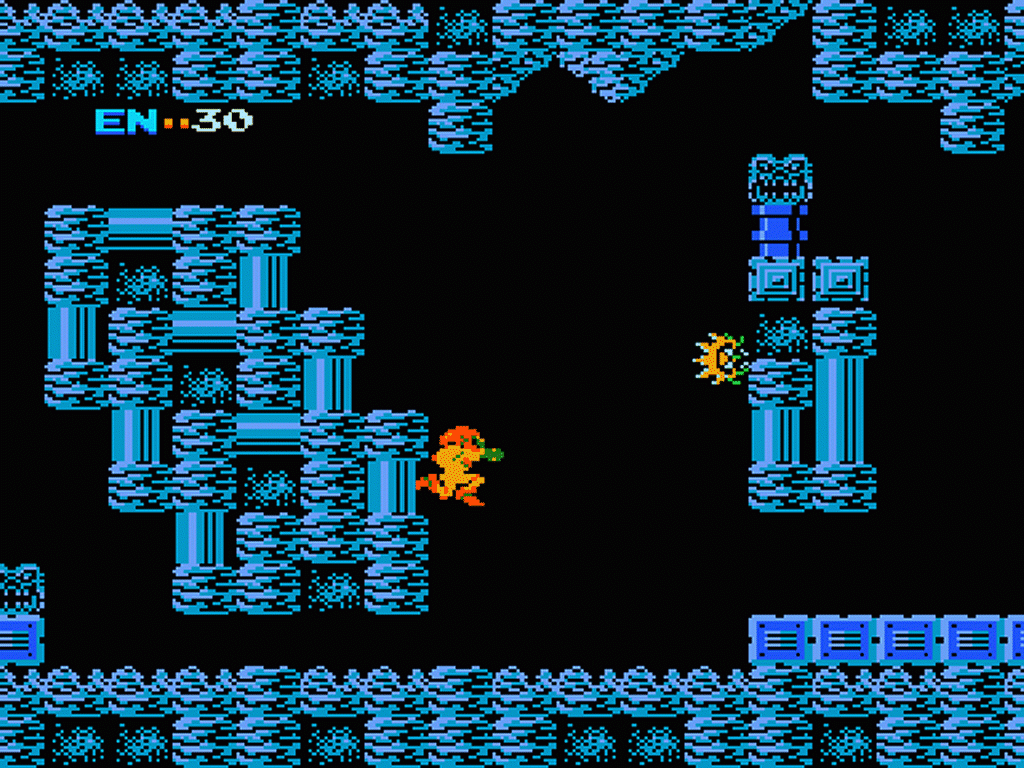
ZK: And most of those hours are you walking around and nothing’s happening. Which is nice but…
DL: Yeah, it’s just numbing after awhile. I tried to play Last of Us, which is obviously the most hyped about game, and I’m late to every game. I just got a PS4 in the summer. Even though everyone was like so over it. Okay, this is a classic PS4 game, here we go: I played for like two hours or something and I just don’t care, I don’t wanna kill these zombies. I don’t wanna do anything. It’s so not fun. I don’t like the story, I don’t like the melodrama. I just want someone to hand me the fucking gun, and be like, “You have to destroy all of this shit.” The best game I’ve played in a long time was Wolfenstein. Old Blood I beat, it was fucking so satisfying. I loved every minute of it. It’s like just the games that I like are always the ones that on IGN get good but not great reviews. Those are my favorite games. If there’s a 9.2 I’m out, I don’t want it. Obviously you guys love it because it’s so epic and such a feat of programming, but I’ll just stick to give me a gun, and let me run through this game.
ZK: When that last Batman game came out and everyone was giving it like nines out of tens, I really struggled to imagine how this Batman game could be one of the most sublime experiences.
DL: It’s Batman! It can’t be. It’s fucking Batman. No matter what it is, it’s never gonna be as good as a movie. Another thing about Batman, which I like but bothered me, was that I always feel blind, which makes me feel so weird. Like are they fucking with me, because it’s Batman, a fucking bat that can see at night? Because I can’t see anything. I don’t know what is around me. Maybe I’m not good at turning on the infrared or something at the right moment. My internal compass feels so damaged in that game. I can’t deal.
ZK: Okay, I feel like this is one of those banal, but necessary questions. You have music that’s inspired by games, what would you say is the most influential game music to you?
DL: I have to say that it was probably Metroid, just because I think that the amount of hours put into that game, its music became burned into my memory. And also the music was really strange and creepy and beautiful. And I love that. I do love the Metroid music. I love that music so much.
ZK: Nintendo are magicians in the whole sound design aspect, but they were going for such different sorts of feelings there than usual. Nintendo doesn’t really do spooky and isolated and claustrophobic, but then there’s just this one game.
DL: I think Nintendo became even more kind of saccharine in their later platforms. And Metroid was always their wolf, their intensity zone. I would say NES itself had the most purely creepy stuff going on, probably because the games were so raw, so simple in a way that even in a way where when they were trying to be sweet they ended up weird. There’s a thing where you had to figure it out, that always made it feel a little strange.
ZK: There’s something eerie and off-putting about a basic computer trying to speak to you.
DL: It’s super weird. There’s also those little intercenter challenges in Contra where you have to duck and shoot forward, and the music was good in that. There was a lot of Nintendo games that were creepy. I’m don’t know about later on, I’m sure the N64 they had their branding and everything was down pat, but Nintendo itself was really weird. Like the second Mario freaked me out.
ZK: What was it about the second Mario that freaked you out?
DL: Besides the obvious (reason), of them just porting some other fucking weird-ass game over to Mario, and just sticking Mario characters in it, that fucking egg, the end of the level and the eagle’s mouth opened and that fucking egg comes out or whatever.
ZK: It’s amazing as kids we all figured that out. Like it’s not a key, that’s not a door, but…
DL: I know! It was just creepy. Not part of your life. Unless you read a lot of fantasy books or if you play tabletop RPGs or something, your brain’s a little more calibrated to ideas about creatures and fantastical things. But if you think about it, that’s a really weird way to conduct your adolescent life.
//
Photo of Oneohetrix Point Never via Grantb88 on Wikipedia Commons
Photo of Oneohetrix Point Never, live on stage, via WFMU Radio on Flickr
